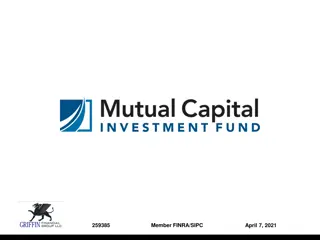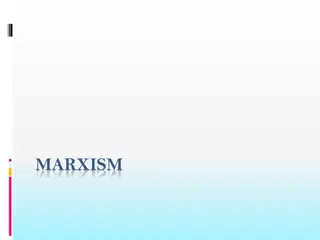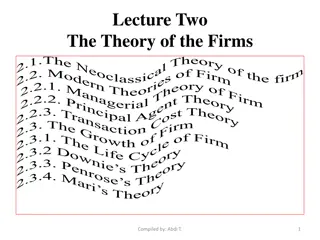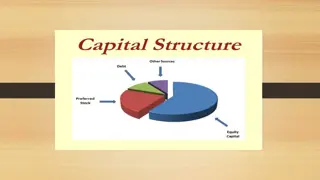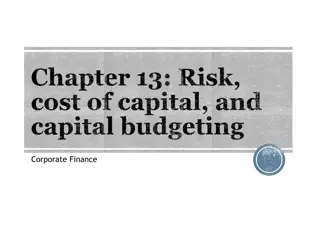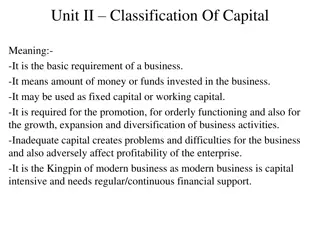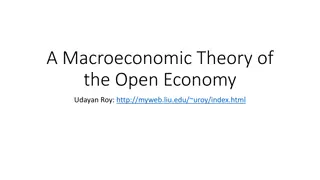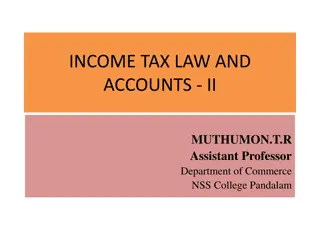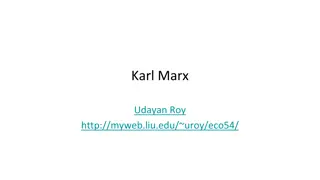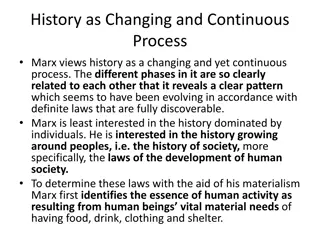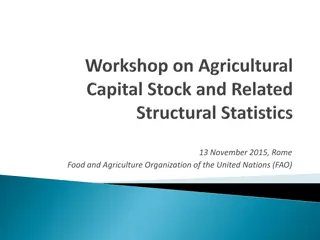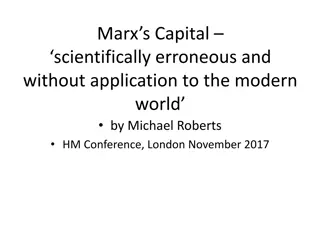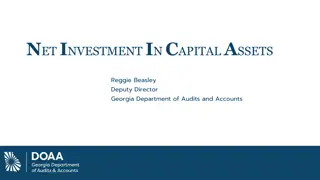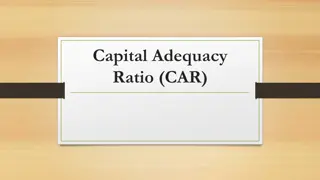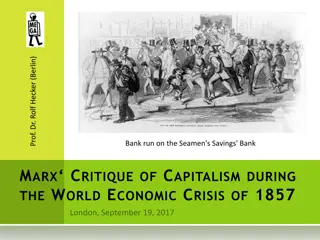Relevance and Limitations of Marx's Capital in Modern Social Theory
Exploring the ongoing relevance of Marx's Capital in contemporary social theory, Gary Herrigel from the Department of Political Science discusses its implications and theoretical considerations. Despite its foundational role, Marx's work also faces practical limitations, such as the challenge of transitioning from value to price. The discourse delves into the theory of exploitation, commodity forms, surplus value, and the significance of work and production as pivotal sites of power relations and transformation.
Download Presentation

Please find below an Image/Link to download the presentation.
The content on the website is provided AS IS for your information and personal use only. It may not be sold, licensed, or shared on other websites without obtaining consent from the author.If you encounter any issues during the download, it is possible that the publisher has removed the file from their server.
You are allowed to download the files provided on this website for personal or commercial use, subject to the condition that they are used lawfully. All files are the property of their respective owners.
The content on the website is provided AS IS for your information and personal use only. It may not be sold, licensed, or shared on other websites without obtaining consent from the author.
E N D
Presentation Transcript
Marxs Capital. Thoughts on its continuing relevance and the theoretical consequences of its limitations Gary Herrigel Department of Political Science
Karl Marx & Me Not a Marx Scholar Student of modern industry and the division of labor Not an economist, but have written several books on industrial development and change in advanced industrial political economies. Marx is an inescapable figure for me Marx a founding figure in modern social and economic thought Teach Marx regularly in a year long core course on the emergence of modern liberal thought (and its critics) Is it a useable view? What is still useable? Marx as a Hegelian and the problem with that. Pragmatism as one reaction on the left to the theoretical limits of Marxian social theory Department of Political Science
Continuing Relevance of Marx First Modern Social Theorist No Marx, no Weber or Durkheim, no Veblen or Parsons Historical, Material and Institutional theory of social development Wholistic theory: Integration of economic, cultural, social and political processes Pioneer of class analysis and of the notion of social class Systematic arguments about the relationship between law and exchange Crucial on-going influence on Modern Economic Thought Theory of mechanization/automation Theory of innovation and historical change (Schumpeter) Theory of crisis and instability Endogenous dynamics of overproduction and profit squeezes (OCC) Department of Political Science
Continuing Relevance of Marx Theory of exploitation Commodity form, absolute & relative surplus value Critique of the idea of equal exchange Characterization of work, production and firm governance as power relations and sites of struggle (modification of Smithian view) Theory of Reification/Fetishism Highlighting the social construction of objects & institutions Lukacs, Simmel, Bourdieu etc Theory of historical transformation Identification of endogenous mechanisms Theory of contradiction Role of classes as transformative agents Insistence on the centrality of work and production Source of identity and interest Driver of change Conditioner of superordinate social & political governance arrangements Department of Political Science
Various Problems with the View Transformation problem : How to move from Value to Price? Significant practical limitation Theory of DoL and Mechanization too focused on specialization as productivity driver Follows Smith: Limited by extent of market production, industry nation Dexterity, time saving, fosters innovation Historical Evidence Taylorism, Fordism, Ultra-specialization Very productive under contingent conditions Rigid Industrial districts, skilled labor, discretion, team work, lean production Profitable Flexible Self-recomposing Specialization can be disadvantageous under conditions of uncertainty Inhibit innovation in firms and regions (Chicago vs Detroit) Decreasing returns to specialization- diversification logic important No natural categories or groupings at scale A variety of viable groupings:Eg: Siemens, General Electric, Apple, Nokia, Garmen, Nintendo Department of Political Science
More Problems Limits of specialization logic continued: Diversification, cross-fertilization seems important Creates stability, fosters innovation, produces enduring growth Costs of specialization avoided Uncertainty limits specialization Limits to Structural View of Hierarchy and Power in Production, Firms and Industries Uncertainty (from innovation and competition) can undermine top down control. Create interest in collaboration Team work Collaborative sub-contracting Cartelization fosters innovation Focus on power asymmetries overlooks collaborative social dynamics that affect direction and character of development and transformation Department of Political Science
Still more problems Limits to core developmental dynamic: Concentration and Centralization of Capital Too dependent on specialization logic Misses processes of disintegration Collaborative production Industrial Districts Supply Chains Problems with class as transformative agent Position in division of labor does not exhaust possibilities for identity or interest formation Over concern for specialization obscures possibilities for identity and interest (even within production) Power and control only one dimension of governance (in firms, industries, states) Focus on class underestimates autonomy of the political Creates myopia concerning possibilities for transformation Department of Political Science
A few more problems Is all market exchange fetishized? Demonization of the market gave rise to idea of central planning Rigid Blocks innovation of various sorts No positive or constructive Marxian theory of the market Interestingly, like Smith, but unlike Rousseau, Marxism tends to view markets from the bottom up that is social forms determined by property and production interest, rather than as political shaped entities Very little in Marx concerning alternative governance forms Neither market nor hierarchy Department of Political Science
A little bit more on limits Politics and collective exploration, in addition to or in spite of power and property asymmetries , seem to shape choices about specialization and strategy when the direction of technological development and of interest is not clear (uncertainty) Many of the questions identified by Marx can t be answered within the action and governance frameworks he provides What we share seems to make it possible for us to exchange How things are governed seems to shape how specialization takes place Theoretical lacunae of these sorts affect Marxism s capacity to accurately characterize dynamics of development at all levels (production, firm, industry, region, nation, global economy etc) Narrow unitary conception of social and historical transformation rooted in contradictions generated by nexus of property-class-production-market reifications obscures alternative transformative possibilities Department of Political Science
Post Marxian Thought One Example: Pragmatism (Dewey, Veblen, Mitchell, Commons, Elias, Dahl, Selznick, Rorty, Unger, Castoriadis, Sabel, Stark, Latour, Boltanski & Thevenmont - etc) Pragmatism sympathetic to the holism in Hegelian/Marxian thought the idea that there was a large overarching interconnected system that both historically constituted actors and was driven by their creative interactions but it rejected the enlightenment ambitions in Hegel and Marx that aimed at a full and complete understanding of emergent social systems and that used that understanding to identify directionality in the historical process. For the pragmatists, following Darwin, the social world, like the natural world, was so multilayered, dynamic and interactive that it was impossible to identify a complete set of stable causal relations that existed across space and time. The best we can do as actors and theorists to develop frames for understanding our world based in our joint efforts to negotiate common problems. Department of Political Science
Pragmatism continued Such frames have power when they work, but one has to be extremely attentive to the limits of any given frame (mode of life, world view, life world, institutional order etc). By searching for, noticing and addressing incidents, processes and events that do not correspond to the expectations that a given frame provided, social players (and theorists) can expand and reform their understandings of the world and possibilities for action. Joint reflection and creativity is in this way considered a central dimension of social process Pragmatism is a holistic learning theory based on attention to the unexpected and revision of our contigently and socially constituted cognitive and practical expectations in response to error. In this way, the world remains a whole or a totality, but it was always an emergent and contingently arranged reality, shaped by the enormous multilayered complexity of social life and the limited capacity of human cognition and human relations to grasp and control what was going on. For pragmatists, this orientation makes democracy socially and politically inclusive problem solving an especially attractive mode of governance, as it maximizes inputs and experiences that can be used for problem solving. Department of Political Science
Pragmatism By contrast, centralized bureaucratic decision making and reified conceptions of individual and collective actors (such as classes) are unreliable as they involve the systematic exclusion of perspectives and the reduction of the multiple sources of self-definition to a small subset of relations and activities. Pragmatism provides a way to abandon unitary conceptions of social and political transformation as well as specific and artificially coherent conceptions of transformative agents, such as the working class. In place of these, pragmatists emphasizes contingency, error, learning and broad, multidirectional and multilayered possibilities for transformation. The interesting and paradoxically parsimonious consequence of this shift is that despite the seeming (and actual) complexity of layers and relational complexes (eg linked ecologies or fields or orders) in the analysis, the mechanism for interpretation remains constant: The key is to identify a shared historically and contextually specific frame of analysis that actors share in common practice, and then focus on the degree to which interrelated players are able to identify and respond to challenges to their frame. The response to unexpected error and inconsistency is what drives transformation in individual and social identities and in social and political organization. Department of Political Science
Pragmatism Ultimately, this orientation gives rise to the ambition to construct forms of social and political governance that facilitate learning and self-and social recomposition. Instead of focusing on the structural possibilities for working class mobilization, class agency and the potential abolition of capitalism, this post Marxian approach to social analysis seeks to identify as many possibilities for the democratization of social, economic and political life as possible. This involves systematic attention to the interpenetration of levels of practice and to the disruptions and opportunities that the dynamics of that interpenetration give rise to. Department of Political Science





